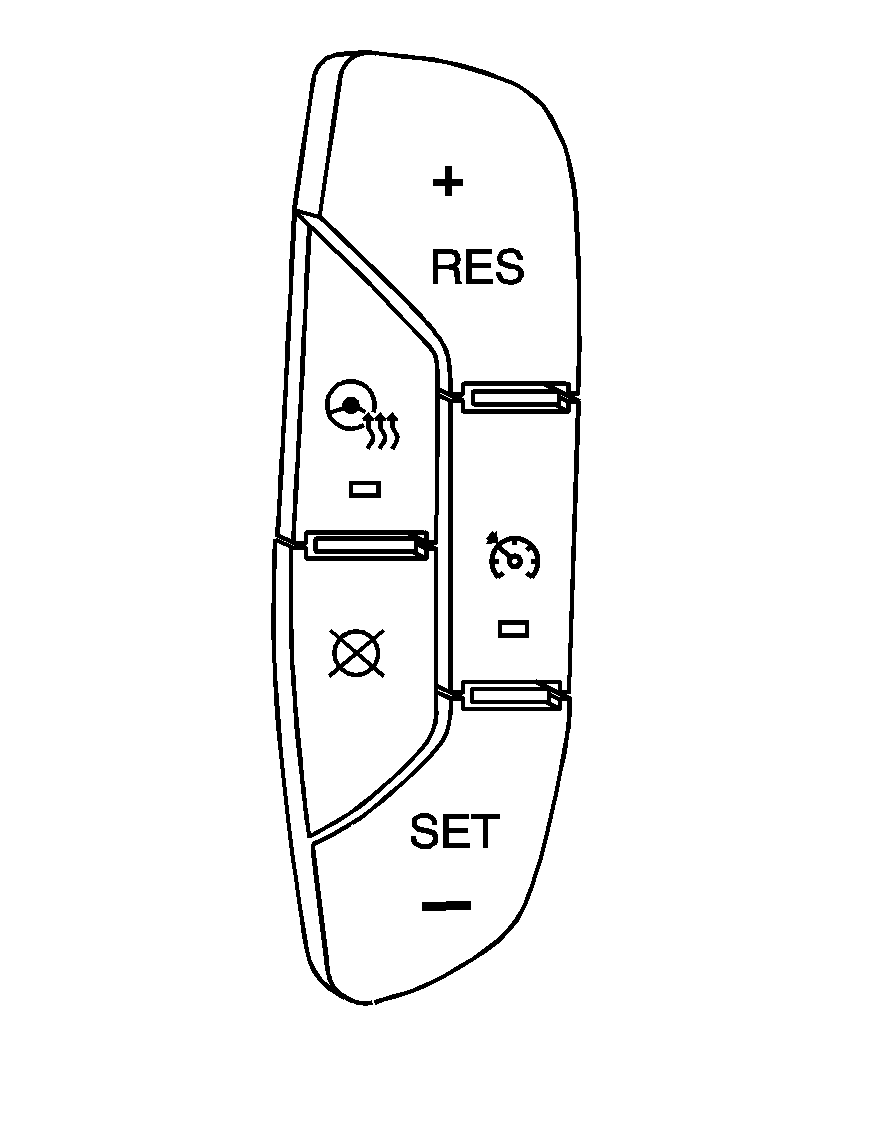Caution: Cruise control can be dangerous where you cannot drive safely at a steady speed. So, do not use the cruise control on winding roads or in heavy traffic.
Cruise control can be dangerous on slippery roads. On such roads, fast changes in tire traction can cause excessive wheel slip, and you could lose control. Do not use cruise control on slippery roads.With cruise control, a speed of about 25 mph (40 km/h) or more can be maintained without keeping your foot on the accelerator. Cruise control does not work at speeds below about 25 mph (40 km/h).
When the brakes are applied, the cruise control turns off.
For vehicles with an Allison® or Hydra-Matic 6-speed automatic transmission, see "Grade Braking and Cruise Grade Braking (Allison Transmission) under Tow/Haul Mode for an explanation of how cruise control interacts with the Range Selection Mode, tow/haul and grade braking systems.
For vehicles with the StabiliTrak® system, if it begins to limit wheel spin while the cruise control is being used, the cruise control will automatically disengage. See StabiliTrak® System. When road conditions allow the cruise control to be safely used again, it can be turned back on.

The cruise control buttons are located on left side of the steering wheel.
(On/Off): Turns the system on and off. The indicator light on the button turns on when cruise control is on and turns off when cruise control is off.+ RES (Resume/Accelerate): Press to make the vehicle accelerate or resume to a previously set speed.
SET - (Set/Coast): Press to set the speed or make the vehicle decelerate.
(Cancel): Press to cancel cruise control without erasing the set speed from memory.
Setting Cruise Control
Cruise control will not work if the parking brake is set, or if the master cylinder brake fluid level is low.
The cruise control light on the instrument panel cluster comes on after the cruise control has been set to the desired speed.
- Press .
- Get up to the desired speed.
- Press the SET- button located on the steering wheel and release it.
- Take your foot off the accelerator.
Caution: If you leave your cruise control on when you are not using cruise, you might hit a button and go into cruise when you do not want to. You could be startled and even lose control. Keep the cruise control switch off until you want to use cruise control.
Resuming a Set Speed
If the cruise control is set at a desired speed and then the brakes are applied, this shuts off the cruise control. But it does not need to be reset.
Once the vehicle speed is about 25 mph (40 km/h) or more, press the +RES button on the steering wheel. The vehicle goes back to the previous set speed and stays there.
Increasing Speed While Using Cruise Control
To increase the cruise speed while using cruise control:
| • | Press and hold the +RES button on the steering wheel until the desired speed is reached, then release it. |
| • | To increase vehicle speed in small increments, press the +RES button. Each time this is done, the vehicle goes about 1 mph (1.6 km/h) faster. |
Reducing Speed While Using Cruise Control
To reduce your speed while using cruise control:
| • | Press and hold the SET- button on the steering wheel until the desired lower speed is reached, then release it. |
| • | To slow down in very small amounts, press the SET- button on the steering wheel briefly. Each time this is done, the vehicle goes about 1 mph (1.6 km/h) slower. |
Passing Another Vehicle While Using Cruise Control
Use the accelerator pedal to increase your speed. When you take your foot off the pedal, the vehicle slows down to the previous set cruise speed.
Using Cruise Control on Hills
How well the cruise control works on hills depends upon the vehicle speed, load, and the steepness of the hills. When going up steep hills, you might have to step on the accelerator pedal to maintain the vehicle's speed. When going downhill, you might have to brake or shift to a lower gear to keep the vehicle's speed down. When the brakes are applied the cruise control is disengaged.
Ending Cruise Control
There are three ways to end cruise control:
| • | Step lightly on the brake pedal. |
| • | Press the button on the steering wheel. |
| • | Press the button on the steering wheel. |
Erasing Speed Memory
The cruise control set speed memory is erased when the cruise control or the ignition is turned off.
